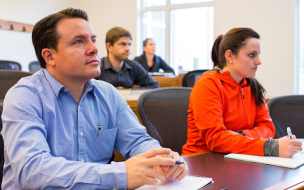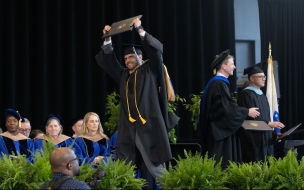In particular, one of the key takeaways he got from the MBA was how to work in multinational teams on international business projects. The cohort at IESE, based in Barcelona, is considered 84% international.
Prior to the MBA, Angel worked for a bevy of leading engineering firms across Spain, including Copcisa and Bridge Technologies SL.
What will you gain from the MBA?
As I come from an engineering background, every subject is completely new for me. So, I can learn about a wide range of subjects that can give me a full picture of business. However, what I think is still more important is the fact that during the MBA you get used to solving unstructured problems, in which many subjective factors play a dominant role over objective factors.
At the end of day, businesses are managed by people — and people are not always are rational.
An MBA is a unique experience to meet people with very different backgrounds from all over the world. It is surprising to realize how many things you can have in common with people from different cultures, and how many differences you can have with people from similar cultures. After the MBA, I will have gained a network spread around the world.
Why did you chose IESE Business School?
I wanted to study in Barcelona, in a top business school with connections to companies from the construction sector. IESE fully satisfies this criteria.
Moreover, IESE offers the exchange program and the overseas modules, which I am considering taking during the second year.
What has been the highlight of the program so far?
The team building activities we do throughout the year. Before starting my MBA, I was aware that I would need to spend a lot of hours working within a team. But what I didn’t know was that we were going to use team sessions to evaluate our performance.
These sessions aim to analyze the efficiency of our team work and the conflicts that arise. Learning how to manage conflicts between people from different cultures, backgrounds, and motivations is going to be one of the [key] takeaways from the MBA.
What skills are transferable from engineering to business management?
Engineers are supposed to have strong analytical skills, and be methodical, hard workers. These skills are necessary in business management.
In engineering it is also essential to have a deep understanding of the problem before you start thinking about the solution. This is completely transferable to business management, where problems are not well defined.
What was your most exciting project at Bridge Technologies SL and why?
The Metro Riyadh L3 “at grade” in Saudi Arabia. Our client was a bigger engineering firm. The project was a joint venture formed by different international companies and had a different approach of how to realize the goal.
My role was to propose and study different structural solutions, evaluating the pros and cons of each one, so they were able to choose one solution to go with. I really liked the idea of studying different scenarios so they could make the decision based on objective information.
What are your career plans post-MBA?
I would like to work in the construction sector, in a role where I can put together my background in civil engineering with the business knowledge acquired during my MBA.
I think I can fit in a construction company or in a toll road operator that is starting to work abroad. I am also considering the option of working in a heavy machinery company.
RECAPTHA :
33
68
71
46








